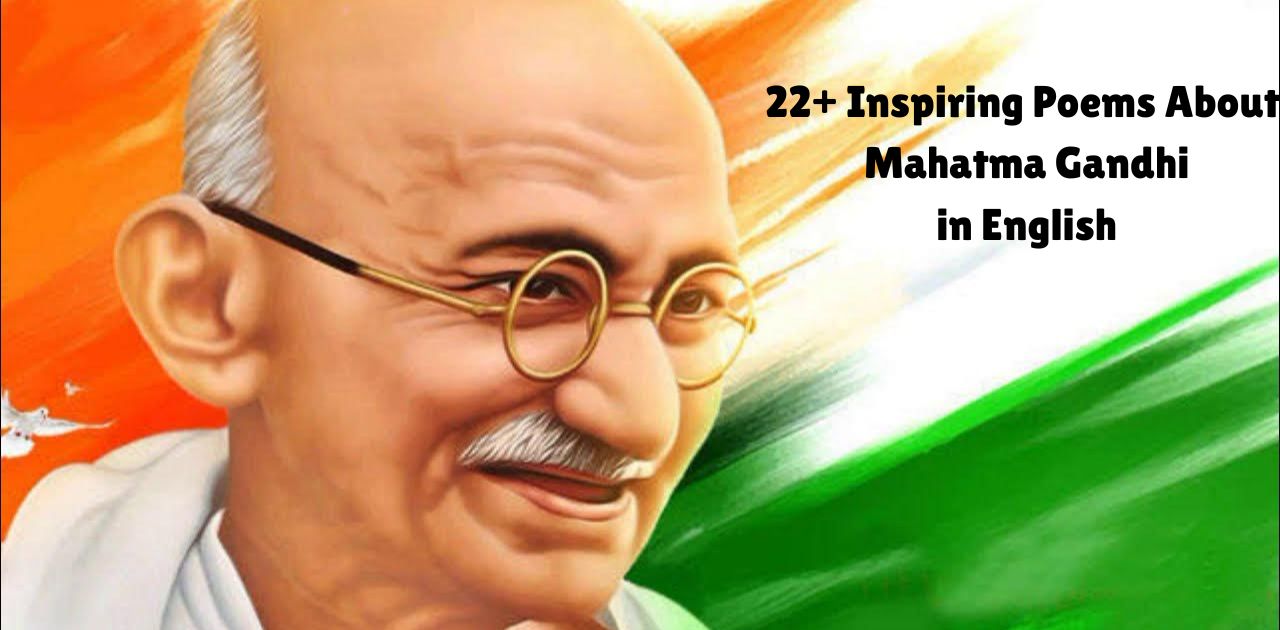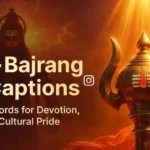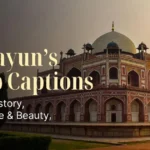Poetry has always served as humanity’s most profound vessel for capturing the essence of extraordinary souls, and few figures in history have inspired as much literary reverence as Mahatma Gandhi. These poems about Mahatma Gandhi in English celebrate not merely a political leader, but a spiritual revolutionary whose teachings continue to resonate across continents and generations. Through verse and rhythm, poets worldwide have attempted to encapsulate Gandhi’s timeless wisdom, his unwavering commitment to truth and non-violence, and his remarkable journey from a shy lawyer to the Father of the Nation.
The Gentle Revolutionary
In gentle hands lay mighty power untold,
No sword nor shield, just truth’s embrace so bold,
Where violence reigned, he planted seeds of peace,
And showed the world that love would never cease.
This poem about Gandhi’s non-violence philosophy captures the paradox of his gentle strength. Gandhi revolutionized the concept of resistance by proving that moral force could triumph over physical brutality. His approach to social change through ahimsa (non-violence) became a template for peaceful movements worldwide, inspiring leaders like Martin Luther King Jr. and Nelson Mandela.
Spinning Wheel of Change
Round and round the charkha spins with grace,
Each thread a dream of freedom’s sweet embrace,
In simple cloth lies power to defy,
The empire’s might beneath India’s sky.
These verses on Gandhi’s Khadi movement highlight how he transformed a simple spinning wheel into a symbol of economic independence. The charkha represented more than just self-reliance; it embodied Gandhi’s vision of decentralized production and his belief that true freedom must include economic liberation from colonial exploitation.
Salt March Echoes
To Dandi’s shore with measured steps he walked,
While millions followed where his conscience talked,
A pinch of salt became freedom’s cry,
As tyranny crumbled beneath truth’s sky.
This poetry commemorating the Dandi March immortalizes one of history’s most brilliant acts of civil disobedience. Gandhi’s 240-mile journey to the Arabian Sea wasn’t merely about salt; it was a masterful demonstration of how symbolic acts could galvanize an entire nation and expose the absurdity of colonial laws.
Bapu’s Light
In darkness deep, a beacon bright appeared,
Father of nations, by all souls endeared,
His light illumined paths of righteousness,
And guided hearts through trials and distress.
This tribute to Gandhi’s spiritual guidance reflects how millions saw him not just as a political leader but as a spiritual father figure. The term “Bapu” (father) became synonymous with moral authority and compassionate leadership, representing Gandhi’s role in nurturing India’s collective consciousness toward independence.
Truth’s Unwavering Voice
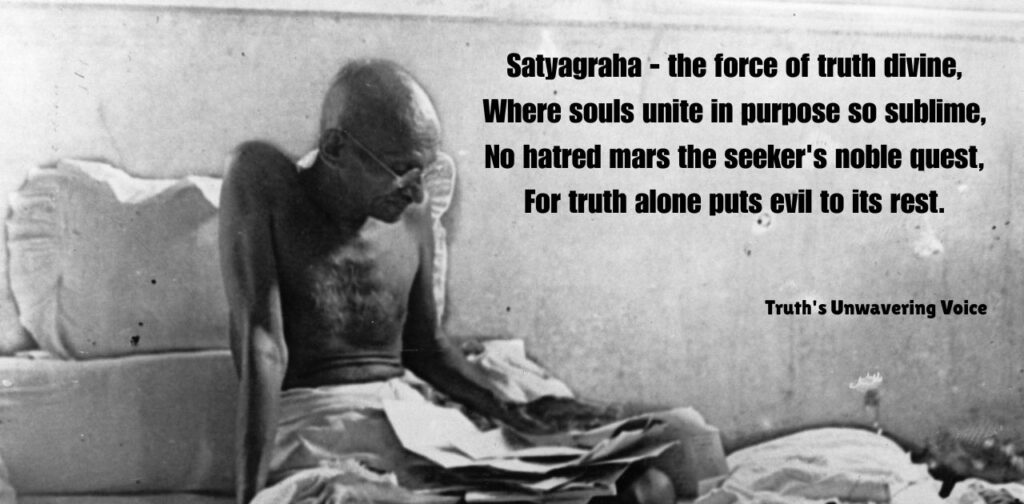
Satyagraha – the force of truth divine,
Where souls unite in purpose so sublime,
No hatred mars the seeker’s noble quest,
For truth alone puts evil to its rest.
These poems about Gandhi’s Satyagraha explore his revolutionary concept of “truth-force” as an alternative to violent resistance. Satyagraha wasn’t passive resistance but active non-violent confrontation with injustice, requiring tremendous courage and moral strength from practitioners.
The Mahatma’s Prayer
“O God, the giver of all good,” he prayed,
For enemies and friends his soul conveyed,
In prayer he found his strength to carry on,
From darkest night until the break of dawn.
This verse inspired by Gandhi’s faith showcases his deep spirituality that transcended religious boundaries. Gandhi’s daily prayers and interfaith approach demonstrated how spiritual practice could fuel social activism while maintaining respect for all religious traditions.
More Posts:22+Kabir Das Famous Poems in Hindi
Ahimsa’s Champion
Violence breeds violence, hatred feeds on hate,
But love transforms and opens heaven’s gate,
In every soul lies spark of the divine,
Where ahimsa blooms, all hearts align.
This poetry on Gandhi’s non-violence teachings delves into ahimsa as more than avoiding physical harm. For Gandhi, non-violence was a way of life encompassing thoughts, words, and actions, requiring practitioners to purify their intentions and approach opponents with genuine compassion.
Simple Living, High Thinking
With just a cloth and wooden bowl in hand,
He showed true wealth lies not in riches grand,
In simplicity found freedom’s truest form,
While materialism brought the world to storm.
These poems about Gandhi’s lifestyle celebrate his philosophy of voluntary simplicity. Gandhi believed that excessive consumption was a form of theft from the poor and that spiritual growth required material restraint. His minimalist approach challenged both colonial luxury and traditional hierarchies.
Freedom’s Architect
With pen and prayer, he built a nation’s dream,
No blueprint grand, just truth’s eternal beam,
Each brick laid down with sacrifice and pain,
Till independence broke oppression’s chain.
This verse on Gandhi’s role in Indian independence portrays him as the master architect of freedom through moral persuasion. Unlike conventional military strategists, Gandhi constructed independence movements using civil disobedience, mass mobilization, and international moral pressure.
The Martyr’s Last Breath
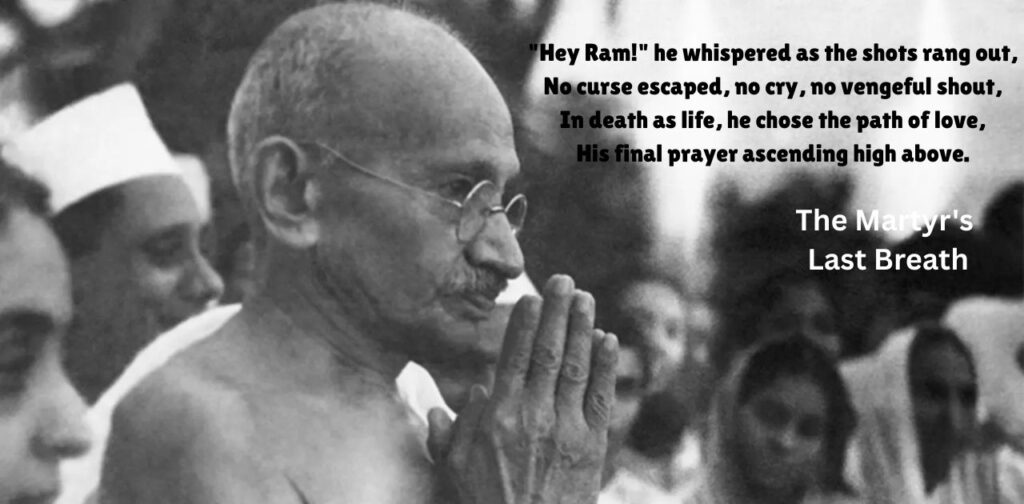
“Hey Ram!” he whispered as the shots rang out,
No curse escaped, no cry, no vengeful shout,
In death as life, he chose the path of love,
His final prayer ascending high above.
This poetry about Gandhi’s assassination captures the tragic irony of a man of peace dying by violence. Even in his final moments, Gandhi remained true to his principles of forgiveness, demonstrating that martyrdom could become the ultimate teaching about non-violence and compassion.
Unity in Diversity
Hindu, Muslim, Christian, all as one,
Beneath the same bright democratic sun,
He dreamed of India where all faiths could thrive,
Where unity would keep the dream alive.
These poems about Gandhi’s vision for India emphasize his commitment to religious harmony and inclusive nationalism. Gandhi’s concept of “Sarva Dharma Sambhav” (equal respect for all religions) stood in stark contrast to divisive communalism and remains relevant in today’s multicultural societies.
Fasting for Justice
When words fell short, his body paid the price,
Through fasting, he made ultimate sacrifice,
Each hunger pang a plea for justice true,
Till hearts of stone began to soften through.
These verses on Gandhi’s hunger strikes explore how he weaponized self-suffering to achieve social reform. Gandhi’s strategic fasting wasn’t mere political theater but genuine spiritual discipline that mobilized public conscience and forced opponents to reconsider their positions.
More Posts :24+ Patriotic Poems in Hindi by Famous Poets
The Lawyer Turned Saint
From London’s courts to India’s dusty roads,
He shed his suit for truth’s more noble codes,
The lawyer’s brief gave way to higher law,
Where justice served without bias or flaw.
This poetry about Gandhi’s transformation chronicles his evolution from a western-educated barrister to a spiritual leader. This metamorphosis wasn’t sudden but involved gradual awakening to social injustice and personal calling to serve humanity’s highest aspirations.
South African Awakening
In foreign land, his conscience first awoke,
When discrimination’s heavy burden broke
Upon his shoulders, truth began to shine,
And forged his spirit in resistance’ shrine.
These poems about Gandhi’s early activism highlight how South African experiences shaped his future methodology. The racial discrimination Gandhi faced there became the laboratory where he developed satyagraha techniques later employed in India’s freedom struggle.
Harijan’s Hope
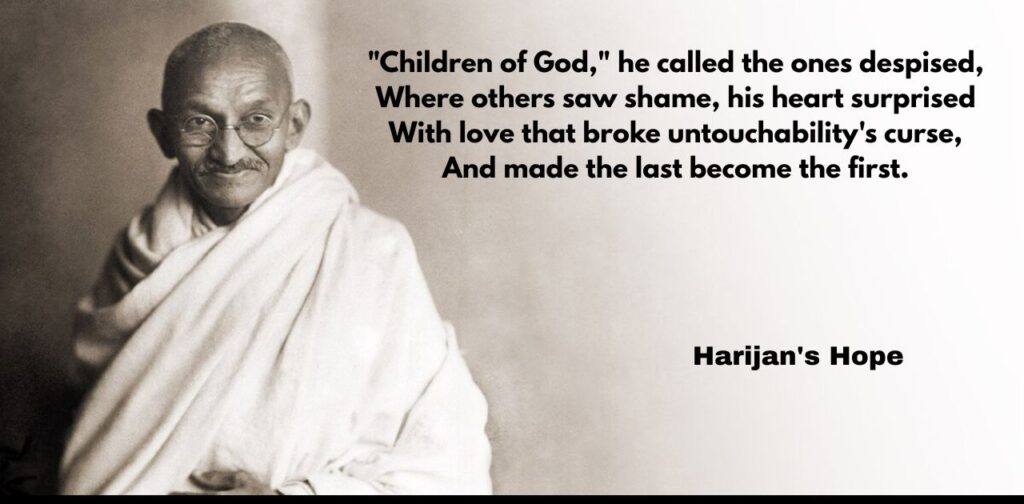
“Children of God,” he called the ones despised,
Where others saw shame, his heart surprised
With love that broke untouchability’s curse,
And made the last become the first.
This verse on Gandhi’s fight against untouchability showcases his revolutionary approach to caste discrimination. By renaming “untouchables” as “Harijans” (children of God), Gandhi challenged centuries-old prejudices and worked tirelessly for social equality and human dignity.
Quit India’s Call
“Do or die!” the clarion call rang clear,
No more would India bow to foreign fear,
One final push to break the colonial yoke,
As freedom’s fire in every heart awoke.
This poetry about Gandhi’s final movement captures the urgency and determination of the Quit India Movement. Despite advanced age and failing health, Gandhi launched this decisive campaign that ultimately accelerated British departure from the subcontinent.
The Ascetic’s Wisdom
In renunciation found he richest treasure,
Wisdom beyond all worldly gold and measure,
Through self-denial reached the highest peak,
Where silence taught what words could never speak.
These poems about Gandhi’s spiritual insights explore how his ascetic practices deepened his understanding of truth. Gandhi’s experiments with self-discipline weren’t mere personal choices but spiritual investigations that informed his political philosophy and social reform methods.
More posts:23+ Heartfelt Poems About Death of a Father
Charkha’s Revolution
No factory’s roar, just wheel’s gentle hum,
Where small is beautiful and all are one,
Each village spins its thread of independence,
In cottage industry finds true transcendence.
This verse on Gandhi’s economic philosophy celebrates his vision of decentralized production and village-based economy. Gandhi’s economic theories emphasized human-scale technology, local self-sufficiency, and sustainable development long before these became mainstream concepts.
Be the Change
“Be the change you wish to see,” he said,
Words that through history’s pages still are read,
In personal transformation lies the key,
To set the world and all its children free.
This poetry inspired by Gandhi’s famous quote emphasizes his belief in individual responsibility for social change. Gandhi understood that authentic transformation must begin within oneself before it can effectively influence others and reshape society.
Eternal Flame
Though bullets stilled his earthly voice that day,
His teachings light the world’s most noble way,
In every heart that chooses love o’er hate,
Gandhi’s flame burns bright through time’s long gate.
These poems about Gandhi’s lasting impact celebrate how his legacy transcends his physical existence. Gandhi’s influence continues through countless movements for peace, justice, and human rights across cultures and generations.
More Posts:30+ Timeless Poems About Past, Present and Future
Swaraj Dreams
Self-rule meant more than freedom from the crown,
It meant each soul could claim its rightful ground,
When inner governance holds perfect sway,
True swaraj dawns like freedom’s perfect day.
This verse on Gandhi’s vision of self-rule explores swaraj as both political independence and personal self-discipline. Gandhi believed that true freedom required individual moral development alongside collective liberation from external control.
The Mahatma’s Message
Across the seas his message still takes flight,
That darkness cannot overcome the light,
In every generation, hearts recall
The Mahatma’s truth that love conquers all.
This poetry about Gandhi’s universal teachings emphasizes how his message resonates globally. Gandhi’s principles of non-violence, truth, and social justice have inspired movements worldwide, proving their universal relevance beyond cultural and temporal boundaries.
Ram Dhun’s Peace
“Raghupati Raghav Raja Ram,” he sang,
While freedom’s bell through India’s valleys rang,
In final breath, God’s name upon his lips,
As mortal coil from noble soul unlips.
These poems about Gandhi’s final words reflect his deep devotion and spiritual surrender. Even facing death, Gandhi’s automatic response was prayer, demonstrating how spiritual practice had become his second nature through decades of discipline.
Phoenix Settlement Memories
In Natal’s hills, a community took root,
Where East met West in brotherhood’s pursuit,
Experiment in living showed the way,
That love could build a better world each day.
This verse on Gandhi’s community experiments celebrates his innovative approaches to communal living. The Phoenix Settlement became a testing ground for Gandhi’s social theories, demonstrating how diverse groups could live together based on mutual respect and shared values.
More Posts:25+ Beautiful Poems for School Magazine in Hindi
Truth’s Pilgrim
Life’s journey was his pilgrimage to truth,
From childhood’s wonder to wisdom’s proof,
Each step revealed new depths of sacred law,
Where perfect truth needs no supporting claw.
This poetry about Gandhi’s lifelong journey portrays his existence as a continuous quest for ultimate reality. Gandhi’s autobiography, titled “My Experiments with Truth,” reflects his understanding that spiritual seeking requires constant learning and humble experimentation.
Conclusion
These poems about Mahatma Gandhi in English serve as eternal testimonies to a remarkable soul whose influence continues shaping humanity’s conscience. Through poetic expression, we honor not just Gandhi’s historical achievements but his timeless message that truth and love remain our greatest weapons against injustice and hatred. Each verse reminds us that Gandhi’s legacy lives on whenever someone chooses compassion over conflict and service over self-interest.

Admin of https://aspirenowa.com/. Sharing Touching and Thoughtful Poems for all Hearts. I Believe in Simple Words, Deep Meaning, and Inspiring Emotions through Poetry for Every Reader.
